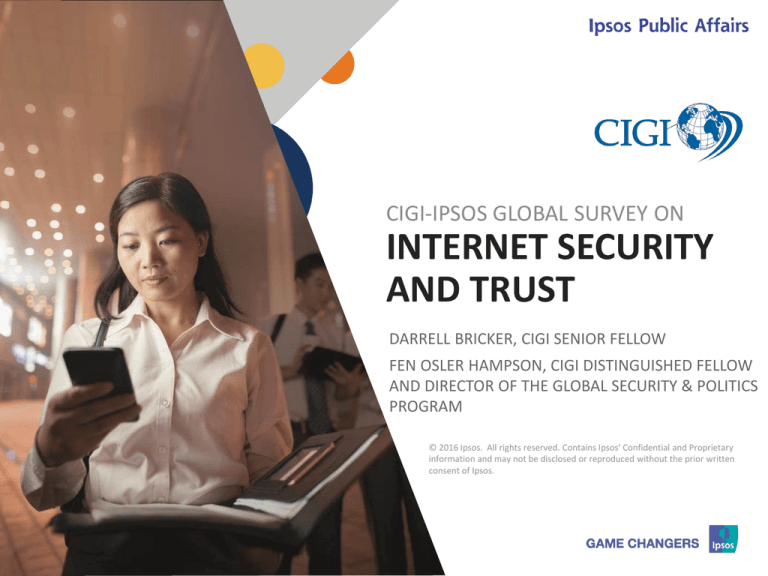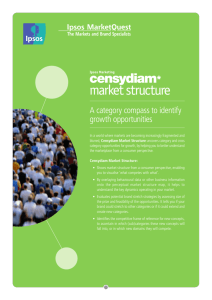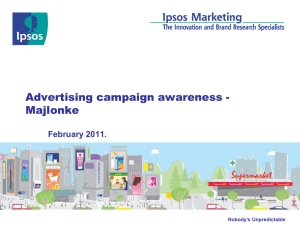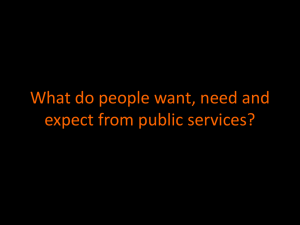
CIGI-IPSOS GLOBAL SURVEY ON
INTERNET SECURITY
AND TRUST
DARRELL BRICKER, CIGI SENIOR FELLOW
FEN OSLER HAMPSON, CIGI DISTINGUISHED FELLOW
AND DIRECTOR OF THE GLOBAL SECURITY & POLITICS
PROGRAM
© 2016 Ipsos. All rights reserved. Contains Ipsos' Confidential and Proprietary
information and may not be disclosed or reproduced without the prior written
consent of Ipsos.
© 2016 Ipsos
1
Methodology
• This survey was conducted by Ipsos on behalf of
the Centre for International Governance Innovation
(“CIGI”) between November 20 and December 4,
2015.
• The survey was conducted in 23 countries plus
Hong Kong. The countries were: Australia, Brazil,
Canada, China, Egypt, France, Germany, Great
Britain, Hong Kong, India, Indonesia, Italy, Japan,
Kenya, Mexico, Nigeria, Pakistan, Poland, South
Africa, South Korea, Sweden, Tunisia, Turkey, the
United States. Total sample 24,143 Internet users.
• Twenty of the countries utilized the Ipsos Internet
panel system while the other four (Kenya, Nigeria,
Pakistan and Tunisia) were conducted by Ipsos
Computer-aided Telephone Interviewing (CATI)
facilities in each of those countries.
© 2016 Ipsos
• In the US and Canada respondents were aged 1864, and 16-64 in all other countries.
• Approximately 1000+ individuals were surveyed in
each country and are weighted to match the online
population in each country surveyed. The precision
of Ipsos online polls is calculated using a credibility
interval. In this case, a poll of 1,000 is accurate to
+/- 3.5 percentage points. For those surveys
conducted by CATI, the margin of error accuracy is
+/-3.1.
BRIC =
APAC =
LATAM =
Brazil, Russia, India, China
Asia Pacific
Latin America
2
Content
1
2
Privacy and Security
4 Monitoring and
Censoring by
Government and Police
3
Behaviour Changes
5
Internet Access
6
Hacktivists
Keeping Information
Safe and Secure
7
Conclusion
© 2016 Ipsos
3
PRIVACY
and
SECURITY
© 2016 Ipsos
4
Fewer are concerned about their online privacy in 2015
(57%) compared to 2014; LATAM witnessed the sharpest
decrease in concern since last year
MUCH MORE CONCERNED
Total
31%
BRIC
41%
27%
North America
23%
G-8 Countries
22%
Europe
21%
57%
64%
64%
76%
26%
63%
81%
19%
60%
69%
59%
67%
53%
59%
52%
56%
50%
51%
31%
38%
Middle East/Africa
© 2016 Ipsos
26%
33%
LATAM
APAC
SOMEWHAT MORE CONCERNED
TOTAL
CONCERNED
2015
2014
32%
30%
30%
29%
Q1. How concerned are you about your online privacy compared to one year ago?(Select one)
Base: All Respondents Total 2014 (n=23,376); Total 2015 (n=24,143)
5
GLOBAL TOTAL
Cyber criminals and internet companies are most likely to
contribute to increasing concerns about online privacy
A GREAT DEAL
Cyber criminals
30%
Your government
30%
Employers
© 2016 Ipsos
24%
36%
Other internet users
Foreign governments
SOMEWHAT
55%
Internet companies
36%
36%
30%
26%
20%
A GREAT DEAL/
SOMEWHAT
31%
28%
Q2. To what extent have the following sources contributed to your being more concerned than last year about your online privacy?
Base: Much/ Somewhat More Concerned About (n=13,867)
79%
72%
66%
60%
57%
48%
6
Among those who are more concerned about online
privacy, North America, LATAM, APAC, and G-8 countries
are more likely to indicate “their government” is the source
of more concern
A GREAT DEAL
Total
30%
North America
30%
LATAM
APAC
G-8 Countries
BRIC
Europe
Middle East/Africa
© 2016 Ipsos
SOMEWHAT
A GREAT DEAL/
SOMEWHAT
60%
30%
37%
39%
27%
28%
36%
22%
64%
62%
28%
57%
56%
34%
32%
66%
37%
25%
29%
67%
23%
Q2. To what extent have the following sources contributed to your being more concerned than last year about your online
privacy? [Your Government] Base: Much/ Somewhat More Concerned About (n=13,867)
55%
7
Among those who are more concerned about online
privacy, six in ten (60%) indicate “their government” is a
source of more concern
A GREAT DEAL
Total
Turkey
Pakistan
Mexico
United States
South Korea
Japan
India
Indonesia
Poland
South Africa
Australia
Great Britain
Brazil
Germany
Canada
Hong Kong
Kenya
France
Italy
Egypt
Sweden
Nigeria
China
Tunisia
© 2016 Ipsos
SOMEWHAT
30%
A GREAT DEAL/
SOMEWHAT
30%
55%
36%
44%
38%
32%
29%
34%
26%
34%
39%
30%
24%
35%
26%
20%
26%
35%
21%
13%
25%
16%
26%
15%
19%
16%
13%
24%
41%
29%
35%
41%
44%
38%
45%
35%
27%
32%
37%
25%
33%
39%
32%
21%
34%
40%
25%
27%
16%
60%
79%
77%
73%
73%
73%
73%
72%
71%
69%
66%
62%
61%
60%
59%
59%
58%
56%
55%
53%
50%
43%
42%
34%
29%
Q2. To what extent have the following sources contributed to your being more concerned than last year about your online
privacy? [Your Government] Base: Much/ Somewhat More Concerned (n=13,867)
8
Among those who are more concerned about online
privacy, North America, LATAM, and G-8 countries are more
likely to indicate “foreign governments” is a source of more
concern
A GREAT DEAL
Total
26%
North America
Europe
35%
25%
21%
Middle East/Africa
APAC
BRIC
© 2016 Ipsos
A GREAT DEAL/
SOMEWHAT
57%
31%
29%
LATAM
G-8 Countries
SOMEWHAT
38%
67%
27%
62%
37%
37%
30%
20%
25%
25%
34%
28%
Q2. To what extent have the following sources contributed to your being more concerned than last year about your online
privacy? [Foreign governments] Base: Much/ Somewhat More Concerned About (n=13,867)
62%
58%
55%
54%
53%
9
GLOBAL TOTAL
Vast majority agree that government should be able to
investigate online communications of someone who is
suspected of a crime
STRONGLY AGREE
My government should work closely with other governments and
organizations... to address cybersecurity threats.
SOMEWHAT AGREE
41%
When someone is suspected of a crime, governments should be
able to find out who their suspects communicated with online.
44%
49%
37%
TOTAL
AGREE
85%
85%
We need to do better at enforcing existing rules about how
companies, governments and other Internet users use my data.
45%
39%
84%
We need new rules about how companies, governments and other
Internet users use my data.
44%
39%
83%
Law enforcement agencies should have a right to access the
content of their citizens’ online communications for valid national
security reasons.
Companies should not develop technologies that prevent law
enforcement from accessing the content of your online
conversations.
If my personal data was compromised due to a data breach, the
consequences are not that significant for me, personally.
© 2016 Ipsos
32%
38%
26%
19%
Q10. To what extent do you agree or disagree with the following statements:
Base: All Respondents 2015 Total (n=24,143)
36%
29%
70%
63%
49%
10
All country groups generally agree their government should
work closely with other governments and organizations to
address cyber security threats
STRONGLY AGREE
Total
North America
Europe
G-8 Countries
BRIC
41%
LATAM
© 2016 Ipsos
85%
44%
37%
87%
50%
40%
87%
47%
38%
85%
47%
44%
Middle East/Africa
APAC
SOMEWHAT AGREE
41%
52%
36%
33%
48%
51%
TOTAL
AGREE
85%
85%
84%
32%
Q10. To what extent do you agree or disagree with the following statements: [My government should work closely with other
governments to address cybersecurity threats. My government should work closely with other organizations, including
companies, civil society, academics, and technologists, to address cybersecurity threats.]
Base: All Respondents No Offline Countries (n=20,137)
83%
11
North America and BRIC are more likely to agree there
needs to be new rules about how companies, governments,
and other internet users use personal data
STRONGLY AGREE
Total
North America
SOMEWHAT AGREE
44%
BRIC
83%
39%
41%
44%
TOTAL
AGREE
47%
88%
42%
86%
G-8 Countries
36%
48%
84%
Europe
36%
47%
83%
APAC
LATAM
Middle East/Africa
© 2016 Ipsos
33%
50%
53%
55%
83%
30%
83%
27%
82%
Q10. To what extent do you agree or disagree with the following statements: [My government should work closely with other
governments to address cybersecurity threats. My government should work closely with other organizations, including
companies, civil society, academics, and technologists, to address cybersecurity threats.]
Base: All Respondents No Offline Countries (n=20,137)
12
BEHAVIOUR
CHANGES
© 2016 Ipsos
13
Over half (55%) avoid opening emails from unknown
addresses, and four in ten cut down on biographically
accurate information given online and/or use commercial
antivirus software (39%)
55%
Avoiding opening emails from unknown email addresses
Cutting down on the amount of biographically accurate
information you divulge online
39%
Using commercial antivirus software
39%
Doing fewer financial transactions online
23%
Making fewer online purchases
21%
Using the Internet less often
Other
11%
3%
None
© 2016 Ipsos
Q4. How else have you changed your behavior? (Please select all that apply.)
Base: All Respondents Total (n=24,143)
17%
14
There has been a general increase in online behaviour
changes compared to 2014, with avoiding certain websites
and changing passwords remaining as the most mentioned
changes
2014
46%
Avoiding certain Internet sites and web applications
41%
Changing your password regularly
Self-censoring what you say online
33%
Changing who you communicate with
Closing Facebook and other social media accounts, etc.
Using the Internet less often
None of these
© 2016 Ipsos
25%
15%
13%
43%
39%
28%
18%
11%
10%
21%
24%
Q3. How have you changed anything about how you behave online compared to one year ago? (Please select all that apply.)
Base: All Respondents Total 2014 (n=23,376); Total 2015 (n=24,143)
15
INTERNET
ACCESS
COMPARED
TO ONE
YEAR AGO
© 2016 Ipsos
16
GLOBAL TOTAL
Finding and accessing websites and content are generally
easier or the same compared to a year ago; none of the
following activities are harder to do compared to one year ago
EASIER
SAME
HARDER
Find the content you seek
46%
44%
10%
Access websites in a quick manner
45%
44%
11%
50%
9%
Access local content and web sites
42%
Rely on your favourite website to be online and working
39%
Count on reliable mobile Internet service
38%
46%
Access foreign content and web sites
36%
50%
15%
Sending or receiving emails to or from foreign addresses
35%
53%
12%
Surf the internet with the knowledge that content is not being
censored
© 2016 Ipsos
29%
51%
50%
Q5. Compared to one year ago, would you say that it is easier or harder to do the following things on the internet:
Base: All Respondents Total (n=24,143)
11%
16%
21%
17
Middle East/Africa are much more likely to think it is easier
to access FOREIGN CONTENT AND WEB SITES compared to
a year ago
EASIER
Total
SAME
36%
Middle East/Africa
© 2016 Ipsos
32%
24%
16%
15%
29%
41%
BRIC
Europe
50%
57%
LATAM
APAC
HARDER
37%
43%
59%
74%
15%
22%
25%
17%
10%
G-8 Countries
13%
76%
11%
North America
13%
76%
11%
Q5. Compared to one year ago, would you say that it is easier or harder to do the following things on the internet: [Access foreign
content and web sites] Base: All Respondents Total (n=24,143)
18
Over four in ten (42%) think it is easier to access
LOCAL CONTENT AND WEB SITES compared to a year ago
EASIER
Total
42%
Kenya
Nigeria
Pakistan
Indonesia
Brazil
Mexico
India
Egypt
South Africa
Tunisia
China
Turkey
Poland
Italy
Hong Kong
Australia
United States
South Korea
Canada
Sweden
Great Britain
France
Germany
Japan
83%
77%
65%
60%
54%
53%
53%
50%
48%
41%
40%
39%
33%
29%
27%
24%
23%
21%
18%
17%
16%
15%
14%
11%
© 2016 Ipsos
ABOUT THE SAME
HARDER
49%
9%
11%
16%
29%
36%
34%
35%
34%
41%
44%
39%
51%
44%
61%
63%
67%
69%
68%
62%
78%
78%
81%
77%
77%
85%
Q5. Compared to one year ago, would you say that it is easier or harder to do the following things on the internet: [Access local
content and web sites] Base: All Respondents Total (n=24,143)
6%
7%
6%
5%
11%
12%
14%
9%
7%
20%
9%
17%
6%
8%
6%
6%
9%
17%
4%
5%
3%
8%
8%
4%
19
MONITORING
AND
CENSORING
BY
GOVERNMENT
AND POLICE
© 2016 Ipsos
20
GLOBAL TOTAL
Individuals are more inclined to trust the internet if they
could access sites and apps with the confidence they are safe
and felt they could share personal opinion without fear
STRONGLY AGREE
You could access sites and applications
with the confidence that they are safe
32%
You felt you could share your personal
opinion without fear
31%
Your government could assure you that
you weren’t being censored
24%
Your government could assure you that
you weren’t being monitored
24%
© 2016 Ipsos
SOMEWHAT AGREE
41%
38%
36%
34%
Q7. Do you agree or disagree that you would trust the internet more if...[You felt you could share your personal opinion without fear]
Base: All Respondents Total (n=24,143)
TOTAL
AGREE
73%
69%
59%
58%
21
LATAM and Middle East/Africa are more likely to trust the
internet more if they could SHARE THEIR PERSONAL OPINION
WITHOUT FEAR
STRONGLY AGREE
Total
69%
47%
Middle East/Africa
30%
45%
BRIC
31%
31%
41%
22%
Europe
19%
G-8 Countries
18%
APAC
17%
© 2016 Ipsos
38%
31%
LATAM
North America
SOMEWHAT AGREE
TOTAL
AGREE
47%
47%
45%
41%
76%
75%
71%
69%
67%
63%
59%
Q7. Do you agree or disagree that you would trust the internet more if... [You felt you could share your personal opinion without fear]
Base: All Respondents Total (n=24,143)
22
Europe and G-8 countries are most likely to be skeptical that
their activities on the internet are not being MONITORED
TRUST COMPLETELY
Total
10%
Middle East/Africa
28%
17%
BRIC
10%
LATAM
10%
APAC
TRUST SOMEWHAT
38%
30%
32%
26%
6%
29%
TOTAL
TRUST
47%
42%
36%
35%
North America
4%
27%
31%
Europe
5%
24%
29%
G-8 Countries
4%
© 2016 Ipsos
24%
29%
Q6. To what extent do you trust that your activities on the internet are not censored or monitored: [Not monitored]
Base: All Respondents 2015 Total (n=24,143)
23
LATAM, BRIC, and North America are more likely to would
trust the internet more if their government could ASSURE
THEY WERE NOT BEING MONITORED
STRONGLY AGREE
Total
58%
41%
BRIC
Europe
34%
24%
LATAM
North America
SOMEWHAT AGREE
TOTAL
AGREE
32%
27%
41%
21%
41%
18%
Middle East/Africa
69%
61%
58%
40%
31%
72%
27%
58%
APAC
16%
39%
54%
G-8 Countries
17%
38%
54%
© 2016 Ipsos
Q7. Do you agree or disagree that you would trust the internet more if... [Your government could assure you that you weren’t being
monitored] Base: All Respondents Total (n=24,143)
24
APAC and G-8 countries are most likely to be skeptical that
their activities on the internet are not being CENSORED
TRUST COMPLETELY
Total
13%
Middle East/Africa
BRIC
North America
LATAM
TRUST SOMEWHAT
34%
17%
34%
14%
9%
35%
37%
14%
31%
TOTAL
TRUST
46%
51%
49%
47%
45%
Europe
9%
G-8 Countries
8%
34%
42%
APAC
9%
32%
40%
© 2016 Ipsos
35%
44%
Q6. To what extent do you trust that your activities on the internet are not censored or monitored: [Not censored]
Base: All Respondents 2015 Total (n=24,143)
25
LATAM, BRIC, and North America more likely to trust the
internet more if their government could ASSURE THEY WERE
NOT BEING CENSORED
STRONGLY AGREE
Total
24%
LATAM
36%
34%
27%
42%
19%
Middle East/Africa
44%
32%
TOTAL
AGREE
59%
38%
BRIC
North America
SOMEWHAT AGREE
72%
69%
63%
28%
60%
Europe
16%
G-8 Countries
15%
41%
56%
APAC
15%
40%
55%
© 2016 Ipsos
43%
59%
Q7. Do you agree or disagree that you would trust the internet more if... [Your government could assure you that you weren’t being
censored] Base: All Respondents Total (n=24,143)
26
HACKTIVISTS
© 2016 Ipsos
27
GLOBAL TOTAL
While a majority agree that hacktivist groups are breaking the
law and should be stopped, only slightly fewer agree that
hacktivists play an important role in holding people accountable
STRONGLY AGREE
Hacktivist groups are breaking the law and
should be stopped
Hacktivist groups play an important role in
holding people accountable
35%
I have a positive view of Hacktivist groups
© 2016 Ipsos
31%
21%
Hacktivist groups are a nuisance and provide no
real value
If nobody else will keep someone accountable,
hacktivist groups should step in and do the job
SOMEWHAT AGREE
37%
26%
18%
13%
30%
34%
40%
Q8. When it comes to exposing the confidential information of various groups, do you agree or disagree with the following:
Base: All Respondents Total (n=24,143)
TOTAL
AGREE
66%
58%
56%
52%
43%
28
Two thirds (65%) think “hacktivists” play an important role
in keeping their own GOVERNMENT(S) accountable
VERY IMPORTANT
Total
29%
India
Kenya
Mexico
Indonesia
Turkey
South Africa
Hong Kong
Nigeria
United States
China
Pakistan
South Korea
Germany
Australia
Brazil
Canada
France
Egypt
Great Britain
Japan
Italy
Poland
Sweden
Tunisia
38%
55%
37%
28%
42%
39%
25%
50%
25%
26%
29%
21%
19%
23%
33%
18%
16%
30%
14%
14%
11%
16%
15%
22%
© 2016 Ipsos
SOMEWHAT IMPORTANT
TOTAL
IMPORTANCE
37%
65%
42%
24%
41%
50%
34%
36%
48%
21%
44%
40%
37%
45%
47%
42%
31%
47%
48%
30%
44%
42%
42%
36%
36%
21%
Q9. To what extent do "hacktivists" play an important role or not in keeping the following accountable: [Your government(s)]
Base: All Respondents Total (n=24,143)
80%
78%
78%
78%
77%
75%
73%
71%
69%
67%
66%
66%
66%
65%
65%
65%
64%
60%
58%
55%
53%
52%
50%
44%
29
G-8 countries and Europe are also least likely to think
“hacktivists” play an important role in keeping FOREIGN
GOVERNMENTS accountable
VERY IMPORTANT
Total
APAC
27%
39%
22%
LATAM
38%
37%
19%
68%
37%
29%
Middle East/Africa
66%
46%
31%
BRIC
North America
SOMEWHAT IMPORTANT
30%
45%
TOTAL
IMPORTANCE
67%
67%
67%
64%
G-8 Countries
16%
45%
61%
Europe
16%
44%
59%
© 2016 Ipsos
Q9. To what extent do "hacktivists" play an important role or not in keeping the following accountable: [Foreign governments]
Base: All Respondents Total (n=24,143)
30
G-8 and Europe are least likely to think “hacktivists” play an
important role in keeping LARGE COMPANIES accountable
VERY IMPORTANT
Total
26%
Middle East/Africa
APAC
39%
37%
47%
27%
47%
30%
68%
67%
40%
20%
LATAM
66%
31%
20%
BRIC
North America
SOMEWHAT IMPORTANT
TOTAL
IMPORTANCE
67%
67%
36%
66%
G-8 Countries
16%
46%
62%
Europe
16%
45%
61%
© 2016 Ipsos
Q9. To what extent do "hacktivists" play an important role or not in keeping the following accountable: [Large companies]
Base: All Respondents Total (n=24,143)
31
BRIC and LATAM are more likely to agree the “Darknet”
should be shut down
STRONGLY AGREE
Total
BRIC
36%
APAC
G-8 Countries
Europe
Middle East/Africa
© 2016 Ipsos
35%
32%
LATAM
North America
SOMEWHAT AGREE
71%
47%
44%
78%
33%
34%
38%
27%
45%
32%
72%
71%
39%
44%
76%
72%
39%
29%
TOTAL
AGREE
69%
25%
Q13. A part of the Internet known as the "Dark Net" is only accessible via special web browsers that allow you to surf the web
anonymously…Do you agree or disagree that the "Dark Net" should be shut down. Base: All Respondents Total (n=24,143)
69%
32
KEEPING
INFORMATION
SAFE &
SECURE
© 2016 Ipsos
33
Three in ten (30%) think the GOVERNMENT IS DOING
ENOUGH to keep personal information secure and safe from
PRIVATE COMPANIES
Enough
Total
Pakistan
India
Indonesia
Mexico
China
Sweden
Egypt
Australia
Canada
United States
Kenya
Tunisia
Turkey
Italy
Hong Kong
Brazil
Germany
South Africa
Great Britain
Nigeria
France
Poland
South Korea
Japan
© 2016 Ipsos
30%
49%
45%
38%
37%
35%
34%
34%
31%
30%
30%
29%
29%
29%
29%
27%
25%
25%
24%
24%
23%
23%
21%
15%
13%
Q12. Do you think that your government does enough or not enough to keep your personal information secure and safe from the
following people: [Private companies] Base: All Respondents Total (n=24,143)
34
Three in ten (31%) think COMPANIES DO ENOUGH to keep
personal information secure and safe from the
GOVERNMENT
Enough
Total
Pakistan
India
Indonesia
Sweden
China
Australia
Canada
France
Italy
Egypt
Great Britain
Kenya
Hong Kong
Nigeria
Tunisia
Turkey
United States
Mexico
Germany
Poland
South Africa
Brazil
South Korea
Japan
© 2016 Ipsos
31%
51%
45%
44%
41%
41%
35%
33%
33%
33%
32%
31%
30%
30%
28%
28%
28%
28%
26%
25%
23%
23%
20%
16%
15%
Q11. Do you think that companies do enough or not enough to keep your personal information secure and safe from the following
people:[Your government] Base: All Respondents Total (n=24,143)
35
GLOBAL TOTAL
Technology companies are most likely to be seen as
responsible for developing rules about how online data is
used, however, the government is most likely to be seen as
the enforcers of the rules
ENFORCE
DEVELOP
69%
Technology Companies
64%
Internet Service Companies
53%
63%
58%
My Government
56%
The United Nations
55%
Civil Society Organizations
55%
Foreign Governments
57%
Ordinary Citizens
58%
51%
© 2016 Ipsos
46%
57%
55%
Q19. Who should help to develop and enforce new rules about how companies, governments and other Internet users use your data?
Base: All Respondents (n=24,122)
36
GLOBAL TOTAL
Individuals are relatively less likely to agree that having all devices
connected to the internet is advantageous and that it doesn’t
matter that everything seems to be connected to the internet
STRONGLY AGREE
I’m concerned that my information may
be bought or sold
40%
I’m concerned about a lack of privacy
as a result of having so much
information about me available on the
internet
38%
I’m concerned that my information may
be monitored
37%
Having all of my devices connected to
the internet is an advantage that
outweighs the risks
24%
It doesn’t really bother me that almost
everything seems to be connected to
the internet
24%
© 2016 Ipsos
SOMEWHAT AGREE
39%
41%
41%
41%
34%
Q20. Thinking about this, to what extent do you agree or disagree with the following statements: [It doesn’t really bother me that
almost everything seems to be connected to the internet] Base: All Respondents Total (n=24,143)
TOTAL
AGREE
79%
79%
78%
65%
58%
37
CONCLUSIONS
Worried about online privacy and security - changes to behavior, expectations reflect this
Growth of e-commerce contingent on growth of trust
Internet is not the “wild west” (hacktivists, Darknet)
Will concern grow with growth of technology?
No monopoly on trust, no immunity from responsibility
“Quis custodiet Ipsos custodes?”
Desire to see all stakeholders involved in
creating and enforcing solutions
© 2016 Ipsos
38
Contacts
Fen Hampson
CIGI Distinguished Fellow
Director of the Global Security &
Politics Program
Centre for International
Governance Innovation
© 2016 Ipsos
Darrell Bricker
Chief Executive Officer,
Ipsos Global Public Affairs
fhampson@cigionline.org
darrell.bricker@ipsos.com
+1.519.885.2444 ext. 7201
+1.416.324.2001
39
ABOUT IPSOS
GAME CHANGERS
Ipsos ranks third in the global research industry.
With a strong presence in 87 countries, Ipsos
employs more than 16,000 people and has the
ability to conduct research programs in more
than 100 countries. Founded in France in 1975,
Ipsos is controlled and managed by research
professionals. They have built a solid Group
around a multi-specialist positioning – Media
and advertising research; Marketing research;
Client and employee relationship management;
Opinion & social research; Mobile, Online,
Offline data collection and delivery.
At Ipsos we are passionately curious about people, markets,
brands and society. We deliver information and analysis
that makes our complex world easier and faster to navigate
and inspires our clients to make smarter decisions.
Ipsos is listed on Eurolist – NYSE – Euronext.
The company is part of the SBF 120 and the
Mid-60 index and is eligible for the Deferred
Settlement Service (SRD).
We believe that our work is important. Security, simplicity,
speed and substance applies to everything we do.
Through specialisation, we offer our clients a unique depth
of knowledge and expertise. Learning from different
experiences gives us perspective and inspires us to boldly
call things into question, to be creative.
By nurturing a culture of collaboration and curiosity, we
attract the highest calibre of people who have the ability
and desire to influence and shape the future.
“GAME CHANGERS” – our tagline – summarises our ambition.
ISIN code FR0000073298, Reuters ISOS.PA,
Bloomberg IPS:FP
www.ipsos.com
© 2016 Ipsos
40



